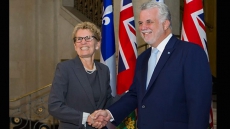For decades scientists have debated whether injectable or oral polio vaccine is the best option for trying to finish the job of eradicating polio. Now a new study offers an answer: both.
The research, published Thursday in the journal Science, says using at least one dose of the more expensive injectable vaccine after children have been vaccinated with the oral serum should speed up eradication. It would also make safer the process of withdrawing the oral vaccine — which contains live but weakened virus — a critical step in the intricately plotted strategy for eliminating polio, known as the end game.
The researchers suggest that giving the injectable vaccine after the oral boosts the immunity in a child's gut better than additional doses of oral vaccine, making them less vulnerable to circulating polio viruses. Gut immunity is thought to be critical because it is believed that is where the virus latches on and begins the infection process.
"This was a critical new piece of knowledge and this knowledge now allows for new strategies, which in turn could lead to an accelerated eradication of the remaining strains of polio virus," lead author Dr. Hamid Jafari, the World Health Organization's director for polio operations and research, said of the findings during a telephone press conference.
The injectable vaccine is the type Canada and most developed countries have used for years. It is safer but significantly more expensive. And it has to be administered by a medical professional whereas oral vaccine drops can be given by trained volunteers.
The community of researchers and public health organizations working on polio eradication have argued for years over whether OPV, as the oral vaccine is called, can get the job done in the developing world.
It is known that in places where sanitation is poor and children suffer from frequent gastrointestinal infections, the oral vaccine sometimes doesn't "take." Some children remain unprotected after seven, eight, even a dozen doses, where two or three should do the trick.
The idea behind this study, which was conducted in India, was to see if giving a dose of IPV after several doses of OPV would induce better protection. It did, significantly. A study published last month in the journal the Lancet found similar results.
The injectable vaccine, called IPV, has had both steadfast proponents and fierce opponents — the latter objecting to its high cost, the need to buy and safely discard mass numbers of syringes and other logistical complications.
Dr. D.A. Henderson, who led the campaign to eradicate smallpox, has been one of the IPV opponents. And he remains unconvinced by the new studies, saying the task of getting at least one dose of injectable polio vaccine into all the children of the world will be a formidable one.
"The added cost both for vaccine and logistics of using IPV could act to slow the severing of chains of (poliovirus) transmission," he said in an email. Henderson is a distinguished scholar at the University of Pittsburgh Medical Center's Center for Health Security.
On the other side of the argument, Dr. T. Jacob John celebrated the findings. A central player in India's long but ultimately successful fight to rid itself of polio, John has argued for years that IPV must be used to complete the job.
"There were many skeptics. This paper dispels doubt if IPV will work well in Uttar Pradesh in India, where the world's lowest vaccine efficacy of OPV was described," he said in an email from Vellore, India, where he works at the Christian Medical College.
The study, by scientists from India and from the Global Polio Eradication Initiative, looked at the response of children previously vaccinated with OPV who were given a booster dose of OPV, IPV or a placebo. They found the children who received IPV got the best immune response.
"Our study provides strong evidence that IPV boosts intestinal immunity among children with a history of multiple OPV doses more effectively than an additional OPV dose," the authors wrote.
The World Health Organization has already changed its policy on polio vaccine and is no longer recommending an all-OPV approach for countries which until now have used only the oral vaccine.
It now recommends that countries that use only OPV should introduce at least one dose of the injectable vaccine into their routine childhood vaccination schedules — a move which will come at a considerable cost for these nations.
OPV costs pennies a dose to buy and administer. Through dogged negotiations with vaccine manufacturers, UNICEF has received an agreement from producers that they will sell IPV for US$1 a dose to the poorest countries and US$1.90 a dose to middle-income countries.
UNICEF is one of the original partners in the polio eradication effort; the others are the service club Rotary International, the U.S. Centers for Disease Prevention and Control and the WHO. In recent years, the Bill and Melinda Gates Foundation has become a major player in the campaign.
The effort to eradicate polio began in 1988 with a target of making the world free of the disease by the start of the new millennium. But the virus has proved to be a much more difficult foe than smallpox, the only human pathogen to have been eradicated. (Rinderpest, a virus that afflicted cattle and other ungulates, was declared eradicated in 2011.)
Polio remains endemic — transmission has never been stopped — in three countries: Pakistan, Afghanistan and Nigeria. And viruses from those countries occasionally reignite spread in neighbouring countries or countries with trade or travel ties.
So far this year there have been 146 confirmed cases of polio in nine countries in Africa, the Middle East and South Asia. Most of the cases — 115 — have been reported in Pakistan, where political instability and religious resistance in the part of the country bordering Afghanistan have led experts to label the country the biggest threat to eradication.





